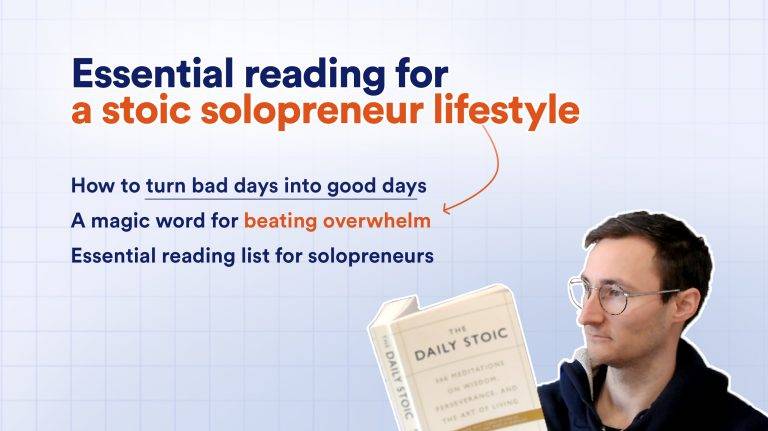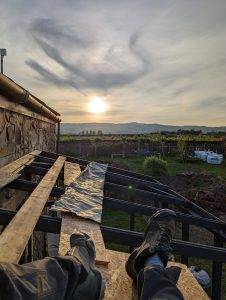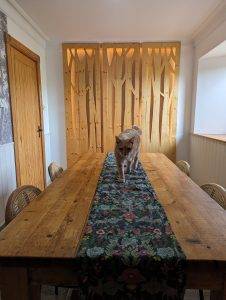Over the last few days, we’ve dug and filled the pond, laid paths, put in new planting, and moved over 8 tonnes of material in the garden.
We had plenty more to do and I just wasn’t managing on my own so I hired in a labourer to help out.
The poor guy was a joiner by trade, but had just had all his tools stolen and was looking for basic tool-free work to get back on his feet.
During the day we got to know each other,
chatting about life, our journeys, our goals etc.
It turns out he used to have his own business too, he built up a team of guys, but the stress of it really wore him down and eventually, he went back to going solo
He looked at my life, my garden, my office, my opportunities.
“so you get to work here? and you have time to do the garden, every day?!”
It’s a part of my routine and something that I’ve come to take totally for granted.
I suddenly saw myself through his eyes and I felt vaguely embarrassed in some way at my good fortune.
He said he wanted to do something similar to what I’d done,
and I guided him about skills he could sell,
or business ideas that were more scalable than his current work.
But in a lot of ways he wasn’t ready yet, he had too many other problems going on which were demanding his attention first:
replacing his stolen tools, for one.
But he’d just finished telling me he wanted off the tools.
Yet now he was working to get money to buy tools so he could do more work which he didn’t want to do in the first place.
It seemed like an oxymoron to me,
But he had to solve this problem first to reach a place of financial stability so he could solve the other problems later.
That makes sense.
It made me realise if your foundation isn’t stable, then you can’t start dealing with the important problems.
You can end up stuck sorting small problems for solutions you didn’t want in the first place.
Sort your environment first
I realised this week how easy it is to be your best self when your environment is good.
Exposure to chaotic environments makes it hard to be consistent.
Being surrounded by bad role models makes it harder to be self-aware.
Having easy access to fast-food makes it harder to resist eating poorly.
Being immersed in drama and distractions makes it harder to be resilient when facing setbacks.
I realised how much easier it is to be resilient and solve problems when you foster good habits and a good environment.
We all play the hand we were dealt.
I’ve had it very easy in a lot of ways:
- I was born in a nice part of a nice town,
- I had a good education
- I had a good upbringing in a good environment
I’ve also faced challenges just the same as anyone else.
- I was fired on the same day I was going to ask for a raise
- I lost a job just as I had secured a mortgage and wouldn’t accept freelance income
- I paid contractors who ran away with almost 20k
If you want to challenge the status quo,
and build a lifestyle business that will support you with freedom and profit and stability,
then you’re going to have to solve a lot of problems that most people don’t face:
Both in terms of business challenges and personal growth challenges.
You’ll need resilience to deal with these problems to avoid getting burned out or overwhelmed.
It’s easier to deal with problems from a place of stability.
The more stable your platform, the bigger the problems you can take on, and the bigger the problems you can solve.
So before you go changing your life,
first learn how to build stability through resilience.
How to build resilience
Sometimes you can’t control your environment.
You can’t fully control which problems will come your way.
But you can control how you react to setbacks both personal and work related.
We all know that one person who seems to take everything in their stride,
who overcomes great difficulty,
who takes on challenges with a smile.
Imagine going through life being optimistic and happy about problems instead of stressed, filled with fear and doubt, agonizing over the lost time or income or status.
Most of the time people like this seem crazy.
But often they have chosen to be positive about the problem.
I wish I was more like that person.
I still moan and sigh when I hit problems.
But I try to be more like that person when I can.
So This week I’m going to share stoic frameworks that I practice that will radically shift the way you encounter and deal with problems over time.
How to use stoic principles to deal with setbacks
Don’t react emotionally
Loss of resilience happens when you face too many problems at once.
It’s easier to be resilient when you come at problems from a place of positivity.
The stress of problems comes from fear of loss:
- fear of losing face
- fear of losing money
- fear of losing time
What is the next logical step
Problems can’t often seem unsurmountable, they’re so big you don’t even know where to start.
So you never start at all.
It’s easier to just sit and despair and moan about all the consequences of this problem.
The issue here is a lack of clarity.
If you don’t know how to deal with the problem, you’re going to get overwhelmed.
But you don’t have to deal with the whole problem all at once.
Remove emotion from the picture.
What is the next logical step you can take right now?
focus on doing that ONE task then move on to the next thing.
Always have a silver lining
The Stoics teach that you suffer the pain of every problem twice:
- once when you hit the problem
- and again every time you think about the problem negatively.
So we want to move from thinking negatively about a problem to positive thinking as soon as possible to minimize damage.
I’m not suggesting being happy about your dog dying.
But finding the silver lining is a route to moving on with your life and living with the sadness instead of dwelling on it.
It’s not fair, he was the best dog, I want him back!
vs
He was a happy dog, he had a long life, I’m glad to have given him a good life.
It’s a shit situation. Mourning and sadness is normal.
But bittersweet is better than bitter.
When it comes to setbacks, Stoics do this by reframing problems to find the positive problem.
I was fired on the same day I was going to ask for a raise
↘️ I didn’t like that job anyway, now I have the opportunity to make a change.
I lost a job just as I had secured a mortgage and the bank wouldn’t accept freelance income
↘️ I’m glad I developed skills so I can find another job
I paid contractors who ran away and stole almost 20k
↘️ I always wanted to learn how to build something like that, now I’m forced getting to do it.
I had a string of crises at work due to 3rd parties fuck up
↘️ It’s easy to be moral when things are smooth, now I get to prove my values and go the extra mile to help the client.
Had to cancel holiday at the last minute
↘️ Now I don’t need to worry about weather and packing
It could have been worse / someone has it worse
If you’re struggling to find the silver lining,
it makes it easier when you realize someone always has it worse.
No matter how bad it gets, there’s always someone having a worse day.
Fostering this mindset helps you move to a position of appreciation for what you have left.
There are other areas of your life you can be thankful for, when one part is going wrong,
or you’re having ongoing problems or setbacks.
Zoom out
Every story has a climactic battle or turning point.
Expand your mindset to a longer timeline and you’ll realise this is just one setback in a much larger journey toward a better outcome.
By looking at the larger picture your current problem will often look insignificant.
I’ve written more making micro and macro mindset shifts here.
The imaginary mentor
We are always on our best behavior when someone is watching:
- We run faster and further when we go jogging with a friend.
- We pick up our dog poop when there are passers-by.
- We stick to habits when we use habit trackers.
So whenever I’m about to flip out, I like to imagine a role model just over my shoulder watching what I do. I imagine what they would do and try to act like them. Often I imagine my wife watching and thinking how she would look at me if I behaved badly. This helps me….
- Be the person I want to be
- Be the bigger person when clients are being petty.
- Treat self-centered people with kindness, even as you set boundaries.
- Make better decisions and think long-term
- Resist eating all da crisps!
You can build your own imaginary accountability mentor to make sure you’re always acting at your best self, even when willpower is low.
I’ll worry about it IF / WHEN…
The human brain is a prediction engine.
It’s built to imagine possible future threats and avoid them. It’s predicated to worry:
“What is that noise…. imagine if that noise was a tiger about to pounce on me and eat me…”
Most of the time, it was just the wind.
But the monkeys with the best imagination often survived longer.
We are no longer living on the savannah, yet we still face threats:
social threats, income threats, status threats, and yes sometimes physical threats.
We often worry about potential future threats,
so much that we prevent ourselves from living in the present.
Remember that future problems, and implications of current problems,
are only potential problems.
Plan for them, yes.
Try to prevent them, yes.
But don’t worry about them unduly until they come to pass.
Don’t get too far ahead of yourself, or obsess about things that could happen.
- I’ll worry about money IF my savings drop below 3 months
- I’ll worry about that lump WHEN I get the scan results back
- I’ll worry about the client’s response IF they come back negatively
It’s amazing how often all those potential problems just disappear if you leave them long enough.
Premortem / prepare for the worst
This contradicts the policy above, but for good reason.
instead of obsessing about problems that could happen and letting our minds run wild,
now we’re going to imagine the worst things that could happen for a short, predetermined amount of time,
then forget about them.
Before taking on any big project, take 5 mins to imagine all the things that could go wrong.
- I will hit problems I don’t know how to solve
- The client might not like the first design
- The client could not pay
- My server could get hacked
- etc etc.
Now you won’t be caught unaware when you hit that problem,
and you’ll be able to react calmly instead of emotionally.
You can also pre-emptively solve some of these problems before they happen:
- I can do research about my tech stack
- I can bake in a set number of revisions
- I can charge upfront in installments
- I can beef up server security in advance.
Imagine you lost it all
This means appreciating what you already have.
Sometimes you have to actively picture not having it to appreciate it.
Stoics like to practice pre mourning the loss of things.
Not to be morbid or maudlin, but to build more appreciation for what you have now, and enjoy them more while you have them..

Struggling with stress in a solo business? Stoicism will help
Subscribe for instant access to my essential reading list for combing stoicism & a solo business.





























